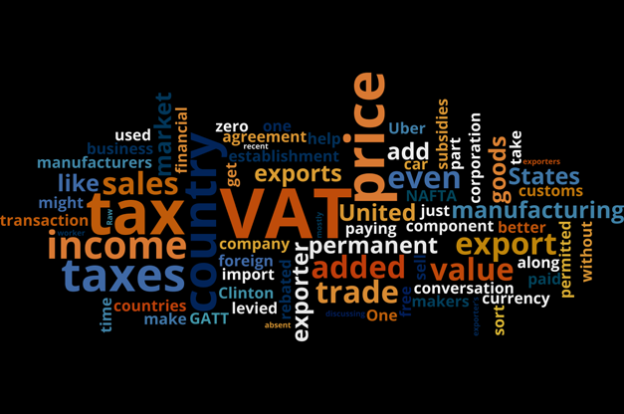

Here a VAT; there a VAT; everywhere a VAT VAT
I had an animated conversation with someone recently about value added taxes, arising in part out of Donald Trump’s mention of them in the recent debate as a disadvantage to the United States. My conversation partner said VAT was neutral, since everyone selling in a market pays them.
I said that’s true as far as it goes, and assuming everything else is equal. But as usual, it’s not.
A value added tax (it would be redundant to say VAT tax, sort of like AC current, but people usually do) is levied as a percentage of the transaction price, sort of like a sales tax. Sales taxes are levied mostly at retail, though, on the final consumer; a VAT is added at each stage of production. Raw material suppliers add it to component makers’ price, component makers add it to their price to manufacturers, and the manufacturers add it to their price. The tax is calculated on the additional value added to the goods at each step.
For many countries, the VATs are a major part of the business taxes they levy. The United States doesn’t have one, relying on the corporate income tax (and some non-material excise taxes).
When a US exporter ships US goods into a country with a VAT, the VAT is collected on the transaction price at the border by the country’s customs service, even if no actual customs duty is due on the import (because of a free trade agreement or just because it is a duty-free item). This is the exporter’s price for access to the market in the country of import.
Since the US doesn’t have a VAT, this price is absent for a foreign exporter to the US.
If the exporters in our example lack a “permanent establishment” in the country they are importing into, they won’t pay an income tax on the profit of their sale into that country, either. It would be easy to get off into the rhubarb in discussing permanent establishments, which I won’t do, but the concept is important to understand.
To change subjects just a little, countries love exports. Exports help earn foreign exchange, reduce trade deficits or boost trade surpluses; they help support the value of a nation’s currency that makes imported goods cheaper for consumers (because the currency buys more).
Various ways have been tried by governments to encourage exports, and most of them are illegal export subsidies under the General Agreement on Tariffs and Trade, or GATT. That includes a thing that the United States used to have, the domestic-international sales corporation. The DISC was in essence an accounting device that permitted a US corporation to shelter a portion of its earnings from export sales from its taxable income.
One of the export subsidies that is permitted under the GATT is the “zero rating” the VAT for export sales. When a product is exported, the VAT has been paid along the way is rebated to the exporter.
Let’s say you are a company that wants to sell into the lucrative US market. Heck, let’s say you are even a US company, but you hate paying taxes. What to do?
One of the things you might do is establish your manufacturing off shore in a place that has a favorable income tax climate for manufacturing, and cheap labor. Maybe one that has a zero rating of the VAT on exports. If it’s a country that has a free trade agreement with the US, even better. If you can avoid the permanent establishment, then you can sell into the US without duties and without paying income taxes, and you get a principal business tax rebated in your “home” country.
And all the while, you can take advantage of the legal, financial, and transportation infrastructure of the US, paid for by those pigeons called the “US taxpayers.” This scenario should be familiar to you, because it has been in all the papers, time and time again.
If this isn’t Shangri La, it’s pretty close.
Unless, of course, you’re a worker in US manufacturing.
Then your next job will be driving a car for Uber. Uber might even make you a sub-prime loan so you can buy a better car to ferry all those hipsters around. If you take the financial risks and make the minimum wage, well then, God bless you, my children.
This is the world that neo-liberals like the Democratic standard bearer, Hillary Clinton, envision. More on this later, but Mrs. Clinton was for the TPP before she was against it, and she used to tout the NAFTA, along with her husband, then the president, who, contrary to what Rachel Maddow says, signed the NAFTA enabling legislation in 1993.
Thanks for your feedback. If we like what you have to say, it may appear in a future post of reader reactions.

